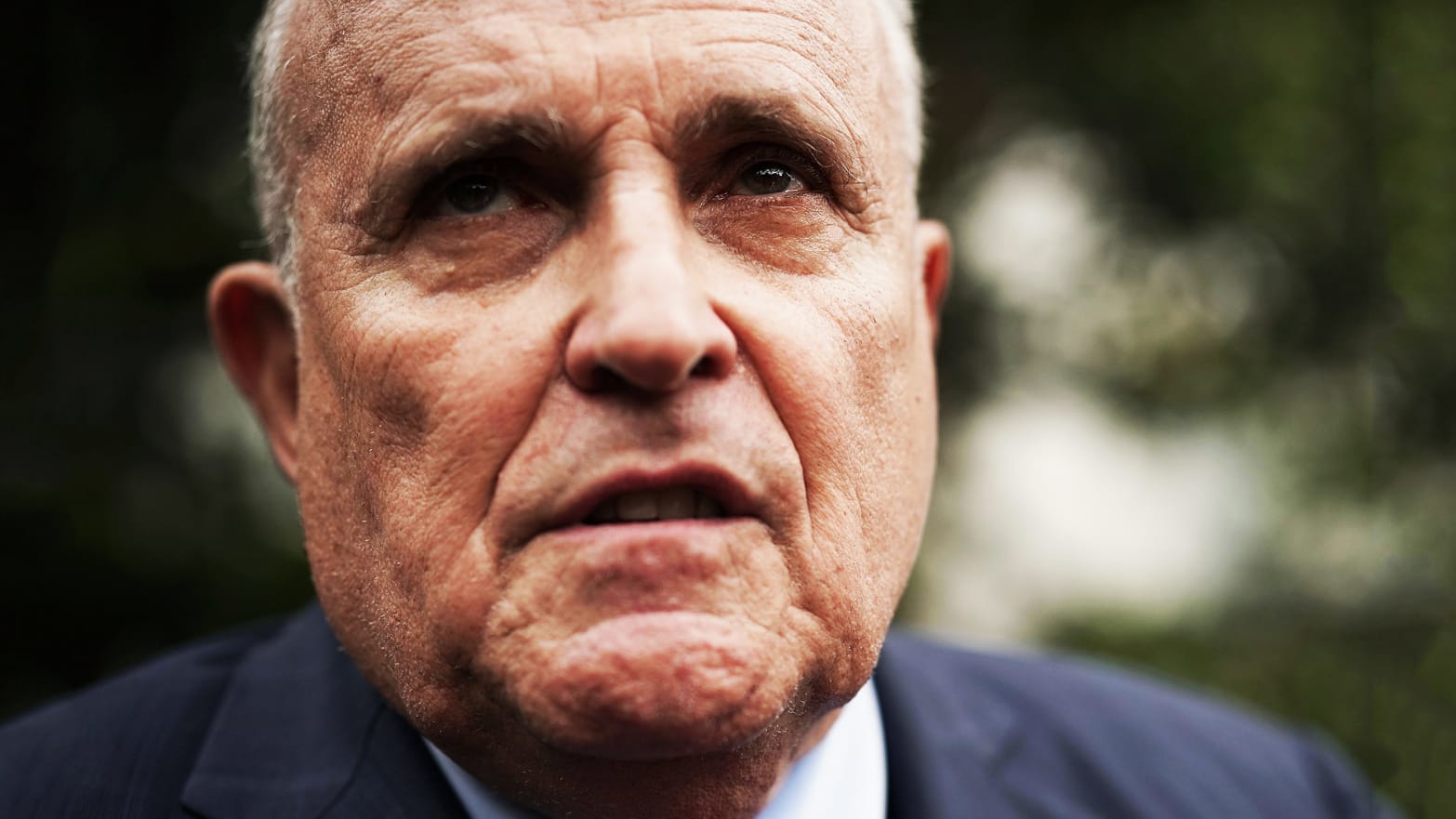Rudy Giuliani’s contacts with officials at the State Department as part of his controversial efforts to dig up dirt on Joe Biden in Ukraine are more extensive than have been publicly reported. And they raise additional questions about the degree to which senior officials throughout the Trump administration were involved in—or privy to—attempts by the president to muddy a top potential political opponent.
Over the course of the past year, Giuliani has participated in a far-flung campaign by Trump allies to unearth damaging information about Biden and his son Hunter. As part of that effort, Giuliani pressed the Ukrainian government to investigate so far unfounded allegations of corruption in the country involving the Bidens. At the time, Hunter Biden was accused of using his father’s political standing to secure lucrative business opportunities abroad. Ukraine’s prosecutor general would subsequently say he had no evidence of any wrongdoing.
This summer, Giuliani briefed U.S. diplomats, including special representative for Ukraine Kurt Volker, on his work in Ukraine and his efforts to convince the administration of Ukrainian President Volodymyr Zelensky to investigate the Bidens. But Giuliani confirmed to The Daily Beast that he also briefed another diplomat: U.S. Ambassador to the European Union Gordon Sondland. President Trump’s lawyer said he briefed both Volker (whom he referred to as the “main one” in terms of his State contacts) and Sondland on multiple conference calls earlier this year about his progress in pursuing a Ukraine investigation.
It wasn’t exactly an unknown topic for Sondland. The ambassador was also closely involved with the Trump phone call to Zelensky in which Trump repeatedly pressured the Ukrainian president to investigate the Bidens.
“I spoke with both of them before and after this conversation,” Sondland told Ukraine’s state-run news agency after the phone call. “The conversation was very successful. They found a common language immediately.” The two leaders discussed Ukraine’s war, energy security, and “the rule of law,” Sondland said in July.
That same day, Zelensky met with both Sondland and Volker to discuss Ukraine’s war with pro-Russian rebels. It was a particularly poignant topic at the time; the U.S. was holding back on nearly $400 million worth of equipment promised to Kyiv to deter Moscow and its allies.
While Giuliani has said publicly that his overtures to the Ukrainians were brokered in part by the State Department—even claiming in an interview with Fox News’ Laura Ingraham that the State Department called him up personally to assign him the task—the specifics of his contacts with Foggy Bottom have remained opaque, including what, if anything, Secretary Mike Pompeo knew about the Ukraine work.
According to two sources inside the department, U.S. diplomats including Sondland and Volker were aware of the details of Giuliani’s work in Ukraine on Biden as early as this spring. Those sources said senior officials at the department were read in on Giuliani’s calls with Volker and Sondland.
“I’ve spoken to Kurt Volker the most about this, but have been on conference calls with [Sondland],” Giuliani said. Giuliani also claimed that he had not asked to be put in touch with Sondland, but one day unexpectedly found himself “on a conference call with him” to discuss the Ukraine efforts.
They weren’t the only senior members of the Trump administration brought into the president’s efforts to use a foreign government to squeeze a political foe. According to The Washington Post, Trump ordered Mick Mulvaney, his acting chief of staff and director of the Office of Management and Budget, to hit pause on hundreds of millions of dollars in military aid for Ukraine—just days before a now-infamous July phone call between Trump and Zelensky. Mulvaney’s OMB deputies then directed officials at the Departments of Defense and State not to distribute the military aid.
And Wednesday morning’s release of the phone call’s transcripts revealed that Trump also suggested Zelensky work with U.S. Attorney General William Barr on a Biden probe.
“I would like to have the Attorney General call you or your people and I would like you to get to the bottom of it,” Trump said, per the transcript, later adding: “Whatever you can do with the Attorney General would be great.”
In a statement to the Washington Post, the Justice Department said Trump never communicated with the attorney general “about having Ukraine investigate anything related to former Vice President Biden or his son.”
Giuliani’s work on Ukraine began months earlier. The Trump attorney’s work, done with the president’s explicit blessing, involved chasing leads on possible origins of the Mueller investigation. It eventually led to his attempts to dig up dirt on the Biden family. This was all happening as Trump was preparing to head into a presidential election year, with Trump and his advisers viewing Biden, the 2020 Democratic frontrunner, as a prominent political enemy.
Giuliani was planning to travel to Ukraine in May to look into allegations of corruption involving the Bidens there. The trip was pulled. But the president’s lawyer met up with Andrei Yermak, a close adviser to Zelensky, in Spain last month. It was before that meeting that Giuliani said the department reached out to him and requested that he take a call with Yermak. And after the meeting, Giuliani told The Daily Beast he briefed Volker and Sondland.
While Volker is known in diplomatic circles as the U.S. special representative for Ukraine, Ambassador Sondland has—until recently—maintained a lower profile. The founder and chairman of Provenance Hotels, Sondland appeared to be uncomfortable with his status as a Trump supporter during the 2016 campaign.
Sondland appeared on a list of bundlers for Trump distributed by the RNC in July 2016 and was listed as a co-host of a Seattle fundraiser for the Trump campaign. When the Seattle Times reported Sondland’s participation in the fundraiser, he and his wife said they were backing out of the event after Trump’s treatment of a Muslim Gold Star family. “Trump’s constantly evolving positions diverge from their personal beliefs and values on so many levels” that the couple could no longer support him, according to a spokesperson.
But as The Intercept subsequently reported, Sondland appeared to have a change of heart after Trump won the election. The hotel magnate donated $1 million to the Trump inaugural committee using limited liability corporations that masked his name from the list of Trump contributors. The move prompted a Federal Election Commission complaint from a campaign finance watchdog, the Campaign Legal Center, but Sondland’s relationship with the Trump administration wasn’t harmed by his apparent discomfort—Trump nominated him to be U.S. ambassador to the European Union in May 2018.
Sondland attended Zelensky’s presidential inauguration as part of the U.S. delegation in May 2019 shortly after Giuliani announced he was canceling plans to visit the country in pursuit of dirt on the Biden family.
Sondland is known inside the State Department as key to helping the administration promote better U.S.-Ukraine trade relations. Together with U.S. Ambassador to Germany Richard Grenell, Sondland has spoken out against the Nord Stream 2 pipeline project, saying it undermines Ukraine’s sovereignty by bypassing the country and cutting off its ability to export natural gas to Europe. In an op-ed, Grenell, Sondland, and U.S. Ambassador to Denmark Carla Sands said the pipeline would “bring more than just Russian gas.” “Russian leverage and influence will also flow under the Baltic Sea and into Europe, and the pipeline will enable Moscow to further undermine Ukrainian sovereignty and stability,” the op-ed said.
The State Department did not respond to a request for comment for this story and did not provide details about whether it had reached out to Giuliani to take a call with Yermak.
But it appears the State Department and other Trump administration officials were well on their way to establishing a connection with the Zelensky team. By the time of Giuliani’s debriefings this August, leading Zelensky ally Ivan Bakanov had already visited Washington twice—once in April and once following Zelensky’s inauguration. Bakanov, who now heads the country’s security service, met with members of Congress, including Rep. Marcy Kaptur (D-OH), one of the leaders of the Ukraine caucus, and officials inside the administration including Fiona Hill, who at the time was serving as the top White House adviser for Russia. Bakanov also met George Kent, the deputy assistant secretary in the European and Eurasian Bureau at the State Department.
Volker and Sondland had also visited Kyiv twice—once in May and the other time coming on the heels of Trump’s July 25 phone call with Zelensky. They went to Ukraine with Sen. Ron Johnson (R-WI) and Energy Secretary Rick Perry, and briefed the White House on their visit just days later. Sondland and Volker met with Zelensky on July 26 to express “unwavering support for Ukraine’s democracy,” according to a U.S. embassy tweet.
This story has been updated to reflect the news that, according to transcripts released by the White House, the president also suggested Ukraine’s president work with AG Barr on a Biden inquiry.



